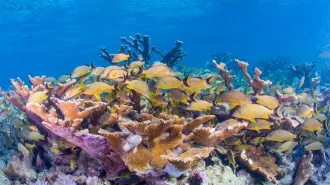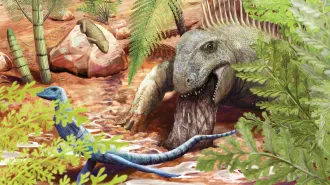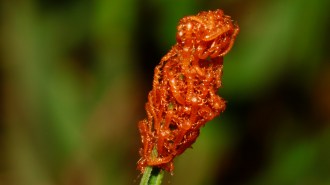Life
Sign up for our newsletter
We summarize the week's scientific breakthroughs every Thursday.
-
 Animals
AnimalsHow tracking golden eagles in Nevada revealed a desert ‘death vortex’
Something is stopping Dry Lake Valley’s golden eagles from reproducing and killing raptors that fly in to fill the void.
-
 Animals
AnimalsSome snakes lack the ‘hunger hormone.’ Experts are hungry to know why
The complex biology of ghrelin, the hunger hormone, has researchers wondering how its absence helps snakes last a long time with no food, if at all.
By Andrea Lius -
 Oceans
OceansEvolution didn’t wait long after the dinosaurs died
New plankton arrived just a few millennia — maybe even decades — after the Chicxulub asteroid, forcing a rethink of evolution's catastrophe response speed.
By Elie Dolgin -
 Animals
AnimalsA sea turtle boom may be hiding a population collapse
In Cape Verde, conservation has boosted the sea turtle population 100-fold — but the male-female balance is way off.
-
 Ecosystems
EcosystemsFood chains in Caribbean coral reefs are getting shorter
Shorter food chains could mean reefs are less able to weather changes in food availability, threatening an already vulnerable ecosystem.
-
 Paleontology
PaleontologyFossilized vomit reveals 290-million-year-old predator’s diet
The regurgitated material from before the time of dinosaurs provides a rare window into the feeding habits of a prehistoric hunter.
By Jay Bennett -
 Health & Medicine
Health & MedicineTell Me Where It Hurts sets the record straight on pain — and how to treat it
A new book by pain researcher Rachel Zoffness demystifies how pain is made and how it can be treated.
-
 Animals
AnimalsA bonobo’s imaginary tea party suggests apes can play pretend
Apes, like humans, are capable of pretend play, challenging long-held views about how animals think, a new study suggests.
By RJ Mackenzie -
 Neuroscience
NeuroscienceBabies brains’ can follow a beat as soon as they’re born
Brain scans and signals show babies can sort images and sense rhythm, offering new insight into how infant brains are wired from the start.
-
 Health & Medicine
Health & MedicineGum disease bacteria can promote cancer growth in mice
In mice, the oral bacteria F. nucleatum can travel to mammary tissue via the bloodstream, where it can damage healthy cells.
By Meghan Rosen -
 Animals
AnimalsSome dung beetles dig deep to keep their eggs cool
A temperate tunneling species of dung beetle seems capable of adapting to climate change, but their tropical cousins may be less resilient.
-
 Animals
AnimalsThese beetle larvae lure in bees by mimicking flowers
These parasitic beetle larvae lure in bees with complex floral aromas before hitching a ride back to their nests and eating their eggs.